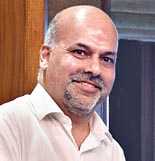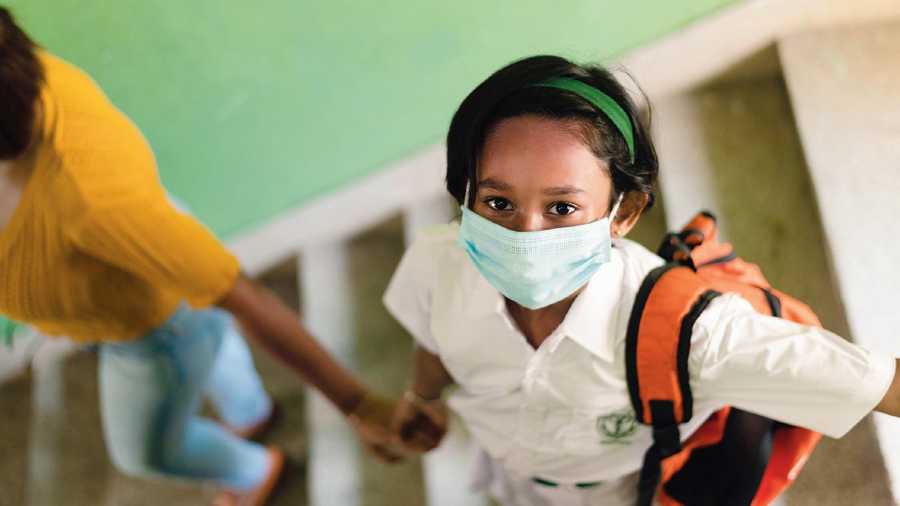My young friend Damayanti, nine years old, was unusually quiet during our last meeting. I have known her since her birth as her mother Swati, a single parent, has been a patient of mine for many years. She always accompanied her mother for her appointments, as it meant a day out for her. They lived in Panihati, about 40km from Calcutta.
Swati was clinically well but she had come for her routine six-monthly follow-up but I could figure out Damayanti was not. Her usual banter was absent, she did not insist her blood pressure or weight to be checked and my attempts to humour her about her pretty earrings did not bring out the toothy grin, which I had become fond of.
She said she missed school and was tired of online classes. This was a familiar story from most children I asked. She then asked me whether I knew when her school would reopen. I said I have no clue.
The travesty inflicted upon children due to school closure is obvious. It is an added loss on top of everything that is happening during the pandemic, which does need to be repeated here as we are all living through it. I personally feel that there has been a huge delay in acknowledging that “online education is not education” (Parliamentary Standing Committee on Education, Women, Children, Youth and Sports on online education). The simple fact is online education system was an emergency patchwork, which significantly underperformed than what all of us had hoped for.
The pandemic has forced us to adapt to a new modality of education but the extremely slow pace of affirmative action on schools reopening and the relative lack of public discussion around the issue is jarring. My discomfort is around this status quo. We cannot brush the huge emotional, social, and learning cost of school closures under the carpet without any acknowledgement of the same. There has to be urgent effort and large-scale public discussion to repair the damage it has inflicted.
Ultimately, it will affect the wealth of the nation
Lancet, a reputed medical journal, in 2007, published a series of research papers on childhood development. Those papers and subsequent publications from Lancet in this domain, have been a template for researchers, educationists, and policymakers. These papers highlight some stark realities about the permanent damage on a child’s life, which can happen if education is stalled. One of the key messages from the research papers was that with loss of each year of school education, the potential of students with respect to their overall development is stunted. In macro-economic terms, this affects the GDP of the nation in the long term. How is this possible?
Let me elaborate. There have been reports from several parts of India that many students have had absolutely no input from schools for almost two years. This has led to forgetting of the basic literacy and numeracy skills they had acquired. These children will always have to play catch up with more privileged and affluent students who have had more educational inputs during this time. Statistically, the number of children who have had very little or no education during this period far outstrips those who have got more inputs. This can result in vast number of young adults, who finish their education, with fewer skills than what they could have acquired.
With fewer skills they will have fewer opportunities at gainful employment and will be engaged in lower-paid jobs. This in the long run will mean we will have poorer families, where the next generation of children also will have access to poorer quality of education and the cycle will continue. This will, over a period of years, continue to bring a generation of adults in the workforce who are potentially less able. Ultimately, it will affect the wealth of the nation. The Lancet papers, with their data, shows that this is a real possibility and not a wide extrapolation of data.
Reciprocal social communication
Let me point out another worrying scenario, which is based on my own clinical experience of working through the pandemic. All child psychiatrists and other child mental health professionals see a sizeable number of under-fives. A section of these children whom we see, have language delays and deficit in reciprocal social communication. Reciprocal social communication is basically the skill of communicating with another person/s through gestures, words, smiles and eye contact. This form of communication is largely dependent on social interaction. The first 1,000 days in the lives of a newborn are crucial for development of this basic toolkit of human survival.
Let us enter the life of Diya, a four-year-old child born, after IVF, to her parents Roshni and Sukrit. Both parents are IT professional and doting parents. Due to the lockdown, Diya has been mostly homebound with no nursery or pre-nursery admission. Parents, because of their workload, are dependent on home help to look after Diya. Compare this with pre-pandemic situation. Diya would be attending a nursery, have visitors at home, would travel, interact, socialise with other adults and children. Now, it was just an endless series of nursery rhymes on YouTube. No wonder, Diya had delay in acquisition of language milestones, avoided looking towards her mother when called and actually cried when she was taken to a park to play with other children, because she had not seen a child of her age for many months.
The number of such children my colleagues and I are having to see are unprecedented. There is a “tsunami of referrals” as my special educator colleague put it and she was right. It is much higher than the numbers we were accustomed to seeing earlier.
Social interaction is perhaps next to oxygen and food for brain development. A child’s brain develops deeper neuronal (neurons are brain cells) connections through social interaction.
The road ahead
So the real worry is how this complete lack of social interaction and dependence on increased screen time will affect the brain development of young children? Can this loss of growth of brain cells be made up ever? If not, what is the personal, social and economic impact of it?
Until recently, I was lulled with the belief that the situation in our country (with respect to school closures) was at par with most other low- and middle-income countries in the world. My blissful ignorance was eradicated by real-time data posted on a website coordinated by UNICEF, Johns Hopkins University and World Bank. covideducationrecovery. global/ maps/ gives surprising data. Many countries are faring much better with reopening of educational institutes. I was initially surprised to note World Bank being a partner in this project but in every way, it makes sense. The longer we keep our educational institutes closed there will be an inevitable impact on GDP of the nation in the future.
So what can be done? A lot really, but we have to begin with acknowledging the depth of the problem. Reinvesting all possible resources in early childhood development and education now is imperative. The importance of it cannot be overstated. The best part is we do not need to reinvent the wheel. There are excellent protocols and guidelines on how to do it, produced by organisations such as UNICEF and World Bank, to name a few.
Reopening of schools need not be with educational inputs only. Communities can be involved in dusting off the cobwebs (literally) from schools. Let us bring back banter, fun, and learning into children’s lives. Otherwise, India will be poorer in more ways than one.

Dr Jai Ranjan Ram is a senior consultant psychiatrist and co-founder of Mental Health Foundation (www.mhfkolkata.com). Find him on Facebook @jai.r.ram.7
